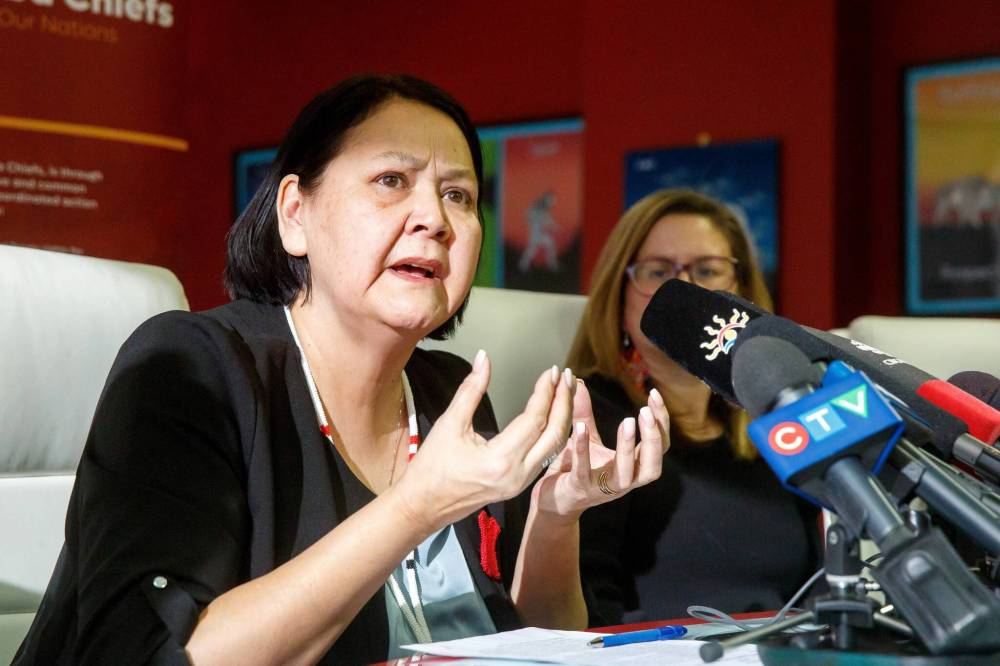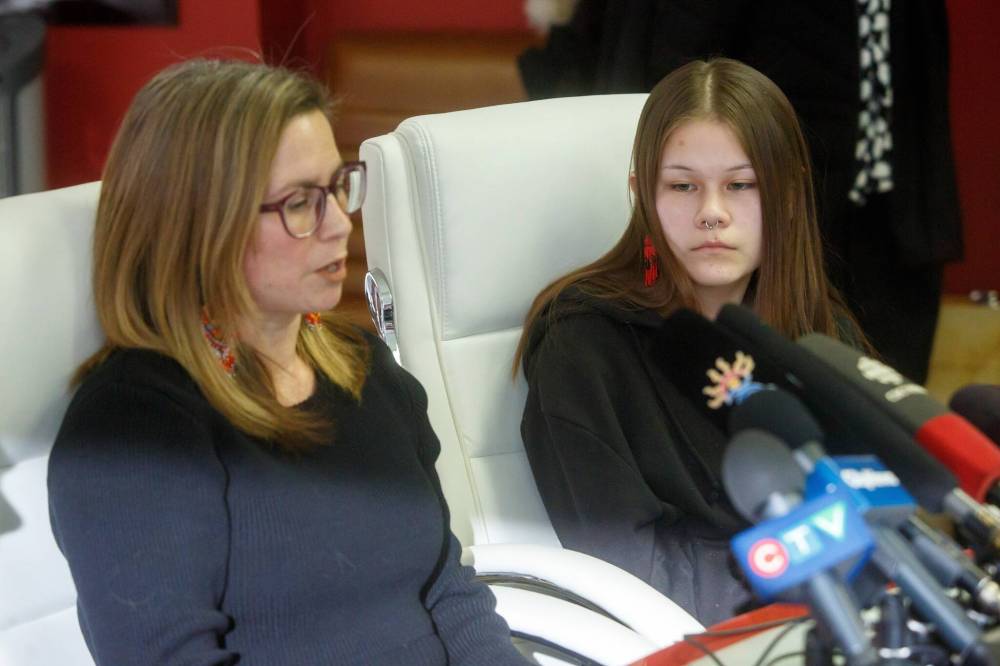AMC eyes April start to landfill search
Advertisement
Read this article for free:
or
Already have an account? Log in here »
To continue reading, please subscribe:
Monthly Digital Subscription
$0 for the first 4 weeks*
- Enjoy unlimited reading on winnipegfreepress.com
- Read the E-Edition, our digital replica newspaper
- Access News Break, our award-winning app
- Play interactive puzzles
*No charge for 4 weeks then price increases to the regular rate of $19.00 plus GST every four weeks. Offer available to new and qualified returning subscribers only. Cancel any time.
Monthly Digital Subscription
$4.75/week*
- Enjoy unlimited reading on winnipegfreepress.com
- Read the E-Edition, our digital replica newspaper
- Access News Break, our award-winning app
- Play interactive puzzles
*Billed as $19 plus GST every four weeks. Cancel any time.
To continue reading, please subscribe:
Add Free Press access to your Brandon Sun subscription for only an additional
$1 for the first 4 weeks*
*Your next subscription payment will increase by $1.00 and you will be charged $16.99 plus GST for four weeks. After four weeks, your payment will increase to $23.99 plus GST every four weeks.
Read unlimited articles for free today:
or
Already have an account? Log in here »
Hey there, time traveller!
This article was published 10/02/2023 (1022 days ago), so information in it may no longer be current.
Specialists could begin searching a Winnipeg-area landfill in April for the remains of two Indigenous women believed to have been slain by an alleged serial killer.
An Indigenous-led committee overseeing the effort is “very optimistic” the remains of Morgan Harris and Marcedes Myran could be found, given success in other cases, according to chairwoman Cathy Merrick, grand chief of the Assembly of Manitoba Chiefs.
The search team is also hoping to recover the remains of an as-of-yet unidentified woman, who’s been named Mashkode Bizhiki’ikwe (Buffalo Woman) by Indigenous elders — if they are at the same site.

MIKE DEAL / WINNIPEG FREE PRESS
Cathy Merrick, grand chief of the Assembly of Manitoba Chiefs, said a search of Prairie Green Landfill could begin in April.“I think it would be safe to say that probably in April that the work can actually really be done and get going on that,” Merrick told reporters Friday. “For anybody to come and say that we can’t find our women, I don’t believe that.”
A feasibility study for a search at the privately-owned Prairie Green Landfill, north of Winnipeg, is expected to begin soon, after the federal government agreed to provide $500,000.
“We do appreciate it, but it’s unfortunate as well to say that it took the lives of many of our women for the government to be able to move and to be able to listen to our concerns as First Nation women,” said Merrick. “It’s a positive step moving forward, and I hope that it continues for further work that needs to be done.”
Once it receives the funds, the committee hopes to have a final feasibility report ready within four to six weeks. The study will help to identify the work, equipment and personnel needed.
Committee members will visit the site for a traditional ceremony and assessment Feb. 24.
Merrick said it’s not yet known how much a search could cost, but additional funding will be sought from governments as required. “We’re not going to go away in the middle of a search if there’s a lack of funding.”
The Harris and Myran families are grateful for the funding and work of the committee, whose ex-officio members include representatives of the Winnipeg Police Service, RCMP, city and province.
The families are eager for a search to begin. They hope it will bring some closure to everyone who’s been affected.
“We know that as much as this was a direct loss for us, it is a greater loss to our community,” said Harris’s cousin, Kirstin Witwicki, a member of the oversight committee.
Myran’s grandmother, Donna Bartlett, said the wait has been difficult.
“My granddaughter is out there and we need her home,” said Bartlett, who is also on the committee. “I just hope they can do it soon.”
The WPS believes four Indigenous women — Harris, 39, Myran, 26, Buffalo Woman and Rebecca Contois, 24 — were killed by the same man last year.
Remains belonging to Contois were found in a garbage bin in North Kildonan in May, and at the city-owned Brady Road landfill during a police search in June.
Investigators believe Harris’s and Myran’s remains were deposited by waste trucks at Prairie Green in May.
Police decided a search wasn’t feasible due, in part, to the volume of waste deposited over a 34-day period before they learned the women’s remains may be there.
The Indigenous-led committee formed as police faced criticism over the decision and no government took the lead while calls for a search escalated in December, after investigators announced three more alleged killings had been linked to the suspect in Contois’s death.
Jeremy Skibicki, 35, is charged with four counts of first-degree murder. He intends to plead not guilty, said his lawyer, Leonard Tailleur.
A jury trial is scheduled to begin in April 2024, and last up to four weeks.

MIKE DEAL / WINNIPEG FREE PRESS
Morgan Harris's cousin Kirstin Witwicki (left) and daughter Elle Harris, 18.Prairie Green’s owner, Waste Connections of Canada, stopped dumping material in June in a landfill section police marked as a possible search area.
As part of the committee’s work, forensic experts have been looking at newer technology and methods used in past cases, including the search of serial killer Robert Pickton’s pig farm in B.C.
Kristin Flattery, AMC women’s co-ordinator, said the team hopes to conduct all search activity at Prairie Green, rather than transporting 72,000 cubic metres of waste for examination at another site.
“There is a conveyor-belt method that seems to be the best way,” said Flattery. “We’re looking to go to a recycling plant that offered to help us, to lift any metal debris out and then have officers stationed on either side as well as searchers, so we’re very able to very quickly do a hand-eye search.”
A DNA analysis will be done if any remains are found, she said.
If no remains are found, the committee will submit a funding proposal for a search at Brady Road, said Merrick.
Colin Fast, a spokesman for Mayor Scott Gillingham, said the city has not yet received a “specific ask” for any assistance.
Provincial help will be assessed once the feasibility study is completed and reviewed, according to a spokeswoman for Manitoba Premier Heather Stefanson.
Merrick said more action is needed to address some of the factors that put Indigenous women at risk of violence.
She also called for additional documenting measures at landfills to help in any searches in the future.
“The Brady Road Landfill already make extensive use of GPS tracking, but we will be looking at other options to enhance landfill practices to make it easier and quicker to respond to similar situations,” said Fast.
The AMC is creating a database of missing Indigenous women and girls in Manitoba, said Merrick.
chris.kitching@freepress.mb.ca
Twitter: @chriskitching

Chris Kitching is a general assignment reporter at the Free Press. He began his newspaper career in 2001, with stops in Winnipeg, Toronto and London, England, along the way. After returning to Winnipeg, he joined the Free Press in 2021, and now covers a little bit of everything for the newspaper. Read more about Chris.
Every piece of reporting Chris produces is reviewed by an editing team before it is posted online or published in print — part of the Free Press‘s tradition, since 1872, of producing reliable independent journalism. Read more about Free Press’s history and mandate, and learn how our newsroom operates.
Our newsroom depends on a growing audience of readers to power our journalism. If you are not a paid reader, please consider becoming a subscriber.
Our newsroom depends on its audience of readers to power our journalism. Thank you for your support.






